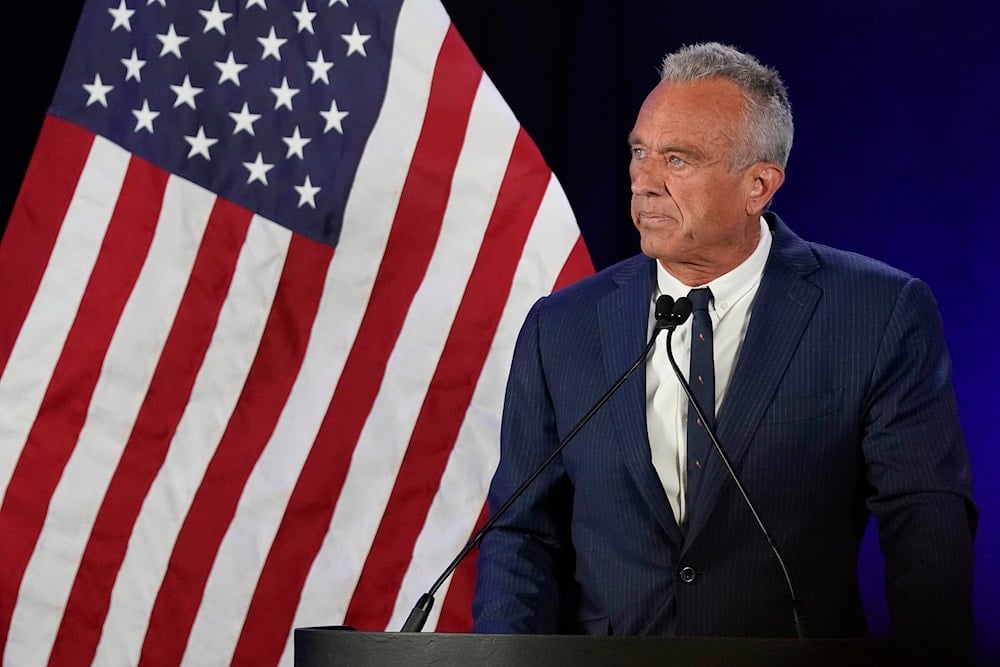Trump-era health report cited fabricated scientific sources: NYT
The Trump-era children’s health report has cited non-existent studies and misrepresented sources, raising concerns about AI use and a lack of review.
-

Independent presidential candidate Robert F. Kennedy Jr. announces he will suspend his presidential campaign during a news conference on Friday, Aug. 23, 2024, in Phoenix. (AP)
A report on children’s health released by the Make America Healthy Again Commission, established under the Trump administration, has come under scrutiny for citing scientific studies that do not exist.
Marketed as a “clear, evidence-based foundation” for federal action on children’s health, the document has instead ignited a controversy over the reliability of its sources and the possible use of AI-generated citations, according to The New York Times.
Among the false references were fictitious studies on direct-to-consumer drug advertising, mental illness, and treatments for asthma in children.
One such instance involved Dr. Katherine Keyes, a professor of epidemiology at Columbia University, who was named as the author of a paper on adolescent mental health that, in reality, doesn’t exist.
“It makes me concerned about the rigor of the report, if these really basic citation practices aren’t being followed,” Dr. Keyes told The New York Times reporters Dani Blum and Maggie Astor.
Experts raise alarm over AI-generated references
The independent media outlet NOTUS first revealed the presence of fabricated citations. The New York Times subsequently identified even more faulty references. In response, the White House uploaded a corrected version of the document by Thursday afternoon.
However, the damage to its credibility appears significant, as noted in the Times’ detailed reporting.
Dr. Ivan Oransky, a professor at New York University and co-founder of Retraction Watch, noted that the pattern of errors closely mirrors issues seen in documents written using generative artificial intelligence. Although he stopped short of confirming whether AI had been used in this case, he emphasized the similarities.
“We’ve seen this particular movie before,” he said. “It’s unfortunately much more common in scientific literature than people would like or than really it should be,” he told The New York Times.
Columbia professor denies authorship of cited study
Asked at a news conference whether the report’s false citations were the result of AI use, White House Press Secretary Karoline Leavitt redirected the question to the Department of Health and Human Services.
A department spokesperson, Emily Hilliard, declined to comment on the origins of the fabricated references. Instead, she described them as “minor citation and formatting errors,” insisting the Make America Healthy Again Commission's report remained a “historic and transformative assessment.”
Nonetheless, the inclusion of false scientific references, especially in a document positioned as a foundation for national health policy, raised broader issues. “Scientific publishing is supposed to be about verification,” Dr. Oransky added in remarks reported by The New York Times.
“There’s supposed to be a set of eyes, actually several sets of eyes. And so what that tells us is that there was no good set of eyes on this.”
Report corrections raise new concerns about review process
While some researchers agreed with portions of the report, particularly its criticisms of synthetic chemicals in the US food supply and the rise of ultraprocessed foods, others found significant fault in its methodology.
Physicians expressed concern over certain claims, including the unfounded suggestion that routine childhood vaccines might be harmful, a claim experts say stems from a misunderstanding of immunology, as highlighted by The New York Times.
For Dr. Keyes, the revelation of fake citations in a government health report added another layer of doubt. Though her research supports the assertion that adolescent depression and anxiety rates are increasing, she found the fabricated references troubling.
“It certainly makes me concerned about the evidence base that conclusions are being drawn from,” she said in the interview conducted by Times reporters.
Scientific inaccuracies erode confidence in findings
Multiple errors plagued the report’s citations. One reference attributed to The Lancet was said to be a 2005 study on drug advertising, but turned out to be a 2000 opinion piece published in another journal by a different author.
Another citation concerning the link between sleep, inflammation, and insulin sensitivity listed the wrong co-author, omitted a correct one, and referred to the wrong journal.
“I just don’t understand that,” said Dr. Thirumagal Kanagasabai, the actual lead author of the cited sleep study. “How could it get mixed up?” she told The New York Times.
The report also falsely listed Dr. Robert L. Findling of Virginia Commonwealth University as the author of a 2009 paper on psychiatric medication advertising in The Journal of Child and Adolescent Psychopharmacology.
No such article by Findling exists, the university confirmed, according to The New York Times.
Thank you, President Trump. As a boy, I sat in the Oval Office where my uncle led on the issues of health and fitness. And now, six decades later, I stand with a transformational leader who fully grasps the public health crisis our great nation faces. I couldn’t be more thrilled… pic.twitter.com/jnuRksNmJ6
— Secretary Kennedy (@SecKennedy) February 14, 2025
In some cases, even accurately cited papers were misrepresented. One section claimed that the fifth edition of a psychiatric diagnostic manual loosened criteria for ADHD and bipolar disorder, citing a 40-fold increase in childhood diagnoses between 1994 and 2003.
However, that edition wasn’t published until 2013. The increase noted in the referenced 2007 study applied only to bipolar disorder and made no mention of ADHD.
For experts like Dr. Kanagasabai, such lapses are egregious. “You want to always go back to the original source,” she said. “And you want to make sure that source is correct.”
Yet the report’s repeated failure to uphold even this most basic scholarly standard has fueled a Trump health report AI controversy, one documented in depth by The New York Times.

 5 Min Read
5 Min Read








